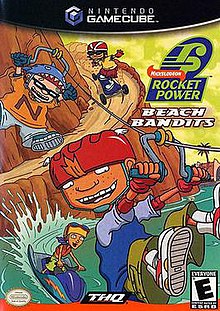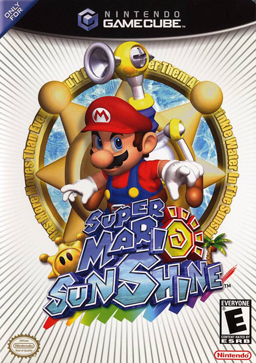
Super Mario Sunshine is a 2002 platform game developed and published by Nintendo for the GameCube. It is the second 3D game in the Super Mario series, following Super Mario 64 (1996). The game was directed by Yoshiaki Koizumi and Kenta Usui, produced by series creators Shigeru Miyamoto and Takashi Tezuka, written by Makoto Wada, and scored by Koji Kondo and Shinobu Tanaka.
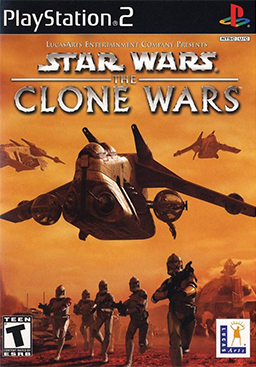
Star Wars: The Clone Wars is a video game set in the Star Wars universe developed by Pandemic Studios and published by LucasArts for GameCube, PlayStation 2 and Xbox. It consists mostly of vehicular combat using clone warships, starfighters, speeder bikes and tanks, as well as missions where players can control Anakin Skywalker, Obi-Wan Kenobi, or Mace Windu on foot. The game is set in the Star Wars prequel trilogy era, with the first level encompassing the Battle for Geonosis from Episode II: Attack of the Clones. The game also features multiplayer modes for up to four players in splitscreen, or online via Xbox Live for the Xbox. It holds aggregate scores of 73 out of 100, 72 out of 100 and 71 out of 100 on review aggregator Metacritic for the GameCube, PlayStation 2, and Xbox, respectively.

Godzilla: Destroy All Monsters Melee is a fighting game based on Toho's Godzilla franchise. It was developed by Pipeworks Software and published by Infogrames under the Atari brand for GameCube in 2002. A companion game developed by WayForward Technologies for Game Boy Advance, Godzilla: Domination!, was released in November of the same year. Destroy All Monsters Melee was later released for Xbox in 2003, featuring additional content and enhanced graphics.

I-Ninja is an action video game developed by Argonaut Games and published by Namco. It was released for the Microsoft Windows, PlayStation 2, Xbox and GameCube. A Game Boy Advance version of the game was announced, then later cancelled.

X-Men: Next Dimension is a fighting game, released in 2002 for the PlayStation 2, Xbox and GameCube video game consoles. It is the third installment in the X-Men: Mutant Academy fighting game series, following X-Men: Mutant Academy and X-Men: Mutant Academy 2.

Die Hard: Vendetta is a 2002 first-person shooter video game developed by Bits Studios. The game was co-published by Fox Interactive, alongside Vivendi Universal Games International in Europe under their NDA Productions subsidiary, and Sierra Entertainment/Vivendi Universal Games in North America. Taking place after the first three Die Hard films, players take on terrorists as John McClane. Reginald VelJohnson reprises his role as Sgt. Al Powell. McClane's daughter, Lucy, is an L.A.P.D. member in the game.

Sega Soccer Slam, also known as simply Soccer Slam, is a sports game released for GameCube, Xbox, and PlayStation 2 in 2002.
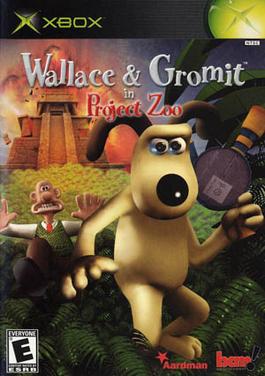
Wallace & Gromit in Project Zoo is a platform video game developed by Frontier Developments and published by BAM! Entertainment for the GameCube, PlayStation 2, Xbox and Microsoft Windows. It is the first console game to feature Aardman Animations' characters Wallace and Gromit and also features the voice of Wallace, Peter Sallis reprising his role.
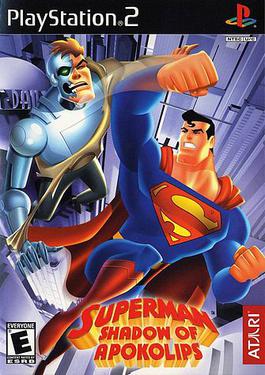
Superman: Shadow of Apokolips is a video game that was released in 2002 for the PlayStation 2 and GameCube consoles. It was developed by Infogrames Sheffield House, published by Infogrames under the Atari brand name, and released in conjunction with Warner Bros. Interactive Entertainment and DC Comics. It is based on the television series Superman: The Animated Series.

SpyHunter is a vehicular combat game. It is a remake and sequel of the 1983 arcade game of the same name first released for PlayStation 2 in 2001. It has since been ported to GameCube, Xbox, Game Boy Advance, Microsoft Windows, OS X, and Tapwave Zodiac. In the game, the player drives the G-6155 Interceptor, an advanced, weaponized spy vehicle. Unlike the original's top-down view, the remake is played with a chase camera, similar to a racing game.

SpongeBob SquarePants: Creature from the Krusty Krab is an action-adventure platform game released for Microsoft Windows, Game Boy Advance, GameCube, PlayStation 2, Nintendo DS and Wii by THQ. An Xbox version may have been planned at some point, but was cancelled for unknown reasons. The PS2, GameCube, and Wii versions are all ports of the same game developed by Blitz Games, while the Game Boy Advance, Nintendo DS, and PC versions were separate games developed by WayForward Technologies and AWE Games respectively. It is based on the Nickelodeon animated sitcom SpongeBob SquarePants, and stars the title character, his best friend Patrick Star and their enemy Plankton as they journey to nine different worlds, supposedly inside the dreams of the characters. The Wii version was a North American launch title. It is also the first SpongeBob game released in Japan, but was released under the title SpongeBob, to mark it as the first video game in the SpongeBob series to have a Japanese release. The PC version of the game is titled SpongeBob SquarePants: Nighty Nightmare.

Charlie's Angels is a beat 'em up video game developed by Neko Entertainment and published by Ubi Soft for the PlayStation 2 and GameCube.

Disney Sports Basketball is a pair of 2002 sports video games released by Konami, one for the GameCube, and the other for the Game Boy Advance.

Disney Sports Football is a pair of 2002 sports video games released in 2002 by Konami for the GameCube and Game Boy Advance.

Disney Sports Skateboarding is a pair of 2002 sports video games released by Konami, one for the GameCube, and the other for the Game Boy Advance.

Disney Sports Soccer, known as Disney Sports Football in Europe, is a pair of 2002 sports video games released by Konami, one for the GameCube, and the other for the Game Boy Advance.

PK: Out of the Shadows is a 2002 action-adventure video game developed by Ubi Soft Montreal and published by Ubi Soft. It stars Donald Duck as Paperinik or "PK" as he battles to stop the Evron Empire from taking over Earth. The game is based on the Italian comic book series PK – Paperinik New Adventures.
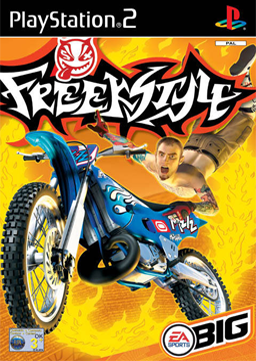
Freekstyle is a 2002 motocross racing video game for the PlayStation 2, GameCube and Game Boy Advance. There are four levels of gameplay: the circuit, a quick race, freestyle, and free run.

King Arthur is an action-adventure game based on the 2004 film of the same title.

The Incredibles is an action-adventure video game based on Pixar's 2004 film of the same name developed by Heavy Iron Studios and published by THQ. The game was released for the Game Boy Advance, GameCube, Mac OS X, PlayStation 2, Windows and Xbox. Samuel L. Jackson, Spencer Fox (Dash), Sarah Vowell (Violet), and Jason Lee are the only actors to reprise their roles from the film, with the rest of the cast, including Craig T. Nelson and Holly Hunter, being replaced with other voice actors - the original movie dialogue and can be heard in cutscenes taken directly from the film. The game's music was composed by Michael Giacchino, who also scored the film. The console versions of the game received a T rating from the ESRB, making this the only Pixar video game to receive that rating.
